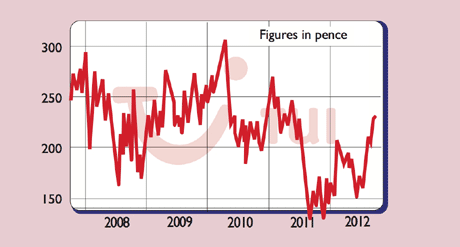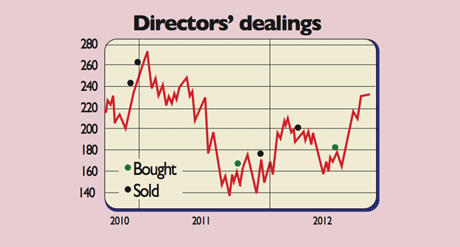Shares in focus: Tough times for top tour operator
The tourism industry is facing some tough challenges. But despite that, Tui Travel is doing relatively well. So, should you buy the shares? Phil Oakley investigates.
Get the latest financial news, insights and expert analysis from our award-winning MoneyWeek team, to help you understand what really matters when it comes to your finances.
You are now subscribed
Your newsletter sign-up was successful
Want to add more newsletters?

Twice daily
MoneyWeek
Get the latest financial news, insights and expert analysis from our award-winning MoneyWeek team, to help you understand what really matters when it comes to your finances.

Four times a week
Look After My Bills
Sign up to our free money-saving newsletter, filled with the latest news and expert advice to help you find the best tips and deals for managing your bills. Start saving today!
Tui Travel's shares pay a decent dividend, but don't be in a rush to buy them, says Phil Oakley.
The business
Tui Travel is Europe's largest tour operator, selling holidays to 20 million customers a year. It has 3,500 travel shops and a fleet of 145 aircraft. In Britain it trades under the recognisable brands of Thomson and First Choice. The company also acts as a middleman, selling hotel rooms and excursions as well as providing services to the cruise-line industry.
It provides a number of specialist holidays, which include sports activities such as skiing and boating, as well as educational travel. Tui is building up its tour operations business in emerging markets such as Brazil, India, Russia and China. Its sales reached £14.7bn in 2011.
MoneyWeek
Subscribe to MoneyWeek today and get your first six magazine issues absolutely FREE

Sign up to Money Morning
Don't miss the latest investment and personal finances news, market analysis, plus money-saving tips with our free twice-daily newsletter
Don't miss the latest investment and personal finances news, market analysis, plus money-saving tips with our free twice-daily newsletter
The history
The company was created from the merger of First Choice Holidays and the tourism business of the German company Tui AG in 2007. The original Tui business can trace its history back to the early 1920s. First Choice began trading in 1973 under the name of Owners Abroad. Up until the 1990s the German side of the business was known as Preussag and was mainly an industrial and transportation company. It then began creating tour-operating companies across Europe, as well as buying Thomson Travel in Britain in 2000.
In 2002, Preussag was renamed Tui AG after buying the owner of that business. Following the merger the new company has had to cope with weak economies and political turmoil in some of its key markets. It has also had to fight the growth of low-cost airlines and do-it-yourself holidays over the internet. An accounting blunder in 2010 temporarily damaged the firm's reputation with investors.
Profits have held up rather well, though. The company has cut costs, paid down debt and turned around some of its underperforming businesses. It has also been helped by a lot of smaller travel agents going out of business and the financial difficulties of big players, such as Thomas Cook.
The chief executive
Peter Long has been in charge since 2007, having previously been chief executive of First Choice holidays. He started out as an accountant but is now a veteran of the travel industry. He knows all about its ups and downs, having worked for International Leisure Group, which went bust in the early 1990s. His experiences there goes a long way towards explaining the prudent way in which Tui Travel is now run. He was paid £1.6m last year.
Should you buy the shares?
You might not use a travel agent to book your own holiday, but lots of people still do. That said, Tui is having to work very hard to keep its customers. It's done quite a good job of moving with the times and is selling more of its holidays over the internet, especially in its Nordic business.
That it owns hotel-room booker LateRooms.com means it's well placed to help people who want to do things for themselves. Tui has also been keen to protect its customers' wallets and has made First Choice holidays all inclusive. Pushing more of its exclusive specialist holidays has also boosted profits.
But there are challenges ahead. Tui's profits have been helped by lots of cost savings and turning around previously weak businesses. There's probably more money to come from these sources, but the gains will run out eventually. Tui has to carry the large costs of its travel agent shops and aeroplanes all year round. It has to make sure it sells enough holidays to do this without flooding the market and encouraging discounting. It also has a reasonable chunk of interest on debt to pay and carries a pension scheme that is underfunded.
Overall, although Tui is doing relatively well, it's difficult to believe the business can grow rapidly. It sells its holidays to customers that live in fragile European economies and who can always use the internet to purchase package deals or parts of such a holiday from somebody else. While the shares don't look particularly expensive and pay a decent dividend, we wouldn't be in any rush to buy them.
The numbers

Stockmarket code: TT
Share price: 236p
Market cap: £2.6bn
Net assets (March 2012): £1.4bn
Net debt (March 2012): £1.2bn
P/e (current year estimate): 10 times
Yield (prospective): 5.0%
What the analysts say
Buy: 10
Hold: 12
Sell: 2
Average price target: 210p
Directors' shareholdings

P Long (CEO): 3,774,589
J Lundgren (deputy CEO): 882,964
W Waggott (FD): 1,112,785
Get the latest financial news, insights and expert analysis from our award-winning MoneyWeek team, to help you understand what really matters when it comes to your finances.
Phil spent 13 years as an investment analyst for both stockbroking and fund management companies.
-
 Should you buy an active ETF?
Should you buy an active ETF?ETFs are often mischaracterised as passive products, but they can be a convenient way to add active management to your portfolio
-
 Power up your pension before 5 April – easy ways to save before the tax year end
Power up your pension before 5 April – easy ways to save before the tax year endWith the end of the tax year looming, pension savers currently have a window to review and maximise what’s going into their retirement funds – we look at how
-
 Somero: trading this overlooked bargain
Somero: trading this overlooked bargainFeatures Mechanical-screed maker Somero dominates its niche and is attractively valued. Matthew Partridge picks the best way to trade it.
-
 How to find big profits in small companies
How to find big profits in small companiesCover Story The small- and micro-cap sectors are risky and volatile. But with careful research and patience, investors could make huge gains. Matthew Partridge explains how to find the market’s top tiddlers.
-
 The hidden gems on Aim, London's junior market
The hidden gems on Aim, London's junior marketFeatures Aim, London’s junior market, is risky – but you can find solid stocks at low prices. Scott Longley reports.
-
Three Aim-listed firms that will thrive in a post-Brexit world
Opinion Matt Tonge and Victoria Stevens of the Liontrust UK Smaller Companies Fund pick three Aim-listed firms that will survive Brexit turmoil.
-
Fetch! The Chinese small-cap stocks to buy in the Year of the Dog
Opinion Each week, a professional investor tells us where she’d put her money. This week: Tiffany Hsiao of Matthews Asia selects three Chinese small-cap stocks with exciting potential.
-
Small and mid-cap stocks with big potential
Opinion Professional investor Guy Anderson of the Mercantile Investment Trust selects three small and medium-sized firms with promising prospects that the market has missed.
-
 Get cheap, reliable growth from smaller companies
Get cheap, reliable growth from smaller companiesFeatures One of the most reliable long-term investment trends is the long-term outperformance of smaller companies over blue chips. Max King picks some of the best ways to buy into this growth.
-
 Now the bitcoin bubble’s burst, what’s the next big thing?
Now the bitcoin bubble’s burst, what’s the next big thing?Features Forget bitcoin, if you want to increase your wealth faster than most other people, you need to find the next big thing. Merryn Somerset Webb suggests some places to look.